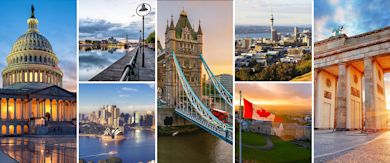- News and articles
- Events
- Find usIDP AustraliaIDP BahrainIDP BangladeshIDP CambodiaIDP CanadaIDP ChinaIDP GhanaIDP Hong KongIDP IndiaIDP IndonesiaIDP IranIDP JordanIDP KenyaIDP KoreaIDP KuwaitIDP LebanonIDP MalaysiaIDP MauritiusIDP Middle EastIDP NepalIDP New ZealandIDP NigeriaIDP OmanIDP PakistanIDP PhilippinesIDP Saudi ArabiaIDP SingaporeIDP Sri LankaIDP Taiwan, ChinaIDP ThailandIDP TurkeyIDP UAEIDP VietnamIDP Corporate
- Social
- English
Topics covered
- Published: 22 May 2022
Furthermore, students studying in regional areas on a graduate Visa will benefit from up to 4 years of Post-Study Work (PSW) rights upon graduation.
New South Wales
Considering study in NSW? Charles Sturt University has regional campuses in Albury-Wodonga, Bathurst, Dubbo or Orange; each with a unique offering.
The Albury campus has a strong environment focus and course options include Environmental Science, Health and Education.
In Goulburn, you can study to become a police officer through the NSW Police Force Academy and take advantage of extensive specialist facilities.
At Bathurst, study options include Nursing or Communication amongst others.
Other institutions in NSW offering the Destination scholarship include: SAE institute, Tafe NSW, the University of New England and the University of Wollongong.
Speak to your local IDP counsellor to learn more and apply for this scholarship.
Victoria
Looking to study in regional Victoria? La Trobe University has a wide course range including Business, IT, Education, Health or Science. La Trobe has regional campuses in Albury-Wodonga, Bendigo, Mildura and Shepparton.
Federation University has a strong network of regional campuses including Ballarat, Gippsland and Wimmera. Explore their extensive course range including undergraduate and post-graduate options in Health, Commerce, Arts, Education, IT and Accounting.
Speak to your local IDP counsellor to understand your best options in regional Victoria and how to apply for this scholarship.
Queensland
There are numerous universities with regional campuses offering this scholarship in Queensland.
Central Queensland University (CQUni) has the largest regional network of universities in Australia. Campus locations include Bundaberg, Cairns, Gladstone, Mackay, Rockhampton and Townsville. CQ Uni pride themselves on smaller class sizes with focused individual learning.
Other universities offering the scholarship include James Cook University, the University of Queensland, Sunshine Coast and Southern Queensland. Your local IDP counsellor can help you pinpoint the best university course for your situation.
Western Australia
Explore Western Australia's impressive universities including Curtin University in Kalgoorlie, Edith Cowan University in Bunbury, the University of Notre Dame in Broome and the University of Western Australia in Albany.
Curtin university in Kalgoorlie has a strong focus on Engineering and Science with new laboratories.
Notre Dame's campus in Broome has a strong environmental research focus, and course options include Nursing, Education and Aboriginal studies. Your local IDP counsellor can help you explore scholarship opportunities in WA.
South Australia
Consider course opportunities with the University of South Australia in their regional campuses of Mount Gambier and Whyalla. Course options include Nursing, Social work, Early Childhood Education and Primary Education.
Northern Territory
Charles Darwin University have 4 campuses in the Northern Territory. Explore exciting course options in Nursing, Education, Community services, IT, Accounting or Engineering.
Tasmania
The University of Tasmania has 3 locations in Burnie, Hobart and Launceston and focus on preparing their students to join the workforce. Explore exciting course options including Nursing, Education, IT, Health, Design or STEM.
How to apply?
Speak with IDP to understand the regional option that best suits your situation. Your local IDP counsellor can help you apply directly to the chosen institution for this scholarship. The Scholarship value is up to 15,000 per year for a maximum of 4 years.
What is regional Australia?
The government made changes to classify a regional area as any area that is not Melbourne, Sydney or Brisbane from November 2019.
Cities like Gold Coast, Perth, Canberra, Newcastle and Wollongong are now considered regional and provides international students an option to gain an additional 5 points by studying in a regional location.
Regional area classification
Sydney, Melbourne and Brisbane are classified under the category of major cities and there is no access to any regional area incentives.
Perth, Adelaide, Gold Coast, Sunshine Coast, Canberra, Newcastle/Lake Macquarie, Wollongong/Illawarra, Geelong and Hobart fall under the category of cities and major regional centres. All other locations are classified under regional areas and other regional areas.
There are 25,000 regional places available in both of these categories and students will have access to priority processing on regional visas. This includes the Regional Occupations List which consists of more jobs compared to the non-regional lists.
In cities and major regional centres, students will have access to an additional year in Australia on a post-study work visa at regional university campuses.
However, in regional areas and other regional areas which includes all other locations, international students can access an additional 2 years in Australia on a post-study work visa at regional campuses.
The reasons behind these changes
The government has done this to boost the economy in regional areas and increase the number of people with specialist skills. Larger cities like Melbourne and Sydney are becoming crowded and congested, and the changes will help to grow the population in areas not as populated.
Keen to explore a regional opportunity?
Although many people are attracted by big cities, a lot of students are surprised at how much they love to live and study regionally. There is a lot of charm in regional Australia and many adventures to be had in the rugged, natural surrounds.
Pros of studying in a regional area
Lifestyle
Benefit from a quality lifestyle in a quieter, lesser populated city.
There's hardly any traffic congestion, no long queues to get where you need to be, allowing you to enjoy hobbies, shopping and eating out in a more relaxed way.
Deeper sense of community
Enjoy a stronger sense of community. People are friendly and take the time to get to know one another in the community. This can help you develop confidence in your English and gain a deeper understanding of the culture and build a strong support network.
Lower cost of living
The cost of living is lower in a regional city, rent and cost of dining out are considerably lower. Enjoy being able to save extra dollars for your future in Australia.
Escape to the great outdoors
Appreciate being close to the great outdoors. Explore the nature, walking tracks and nearby beaches on weekend adventures.
Smaller class sizes
International students enjoy smaller class sizes, allowing them to build a strong network with students and teaching staff. More individualised attention is a benefit and having the opportunity to ask more detailed questions about career opportunities is also a plus
Cons of living regionally
Public transport
Public transport can be limited in a regional area. A way around this is to secure your accommodation closer to public transport options.
Less entertainment
There is less entertainment in a regional city in comparison to a metro one. Instead of having many pubs, restaurants and bars to choose from, there will be a smaller selection. This also depends on the city you go to.
Recommendations for living in regional areas
Ensure you can find the course you wish to study. Whilst the 5 points for studying regionally is tempting, you should ensure that you're studying a course that is aligned with your future career aspirations.
If you're hoping to be a pathway to permanent residency, ensure there is employment availability in the area you will work in. Your local IDP counsellor will be able to help guide you through the options.
One account for all your study abroad needs
Create your profile and unlock a wide array of features including personalised recommendations, fast-tracked applications and much more.
Search for articles
Dive into our extensive collection of articles by using our comprehensive topic search tool.















